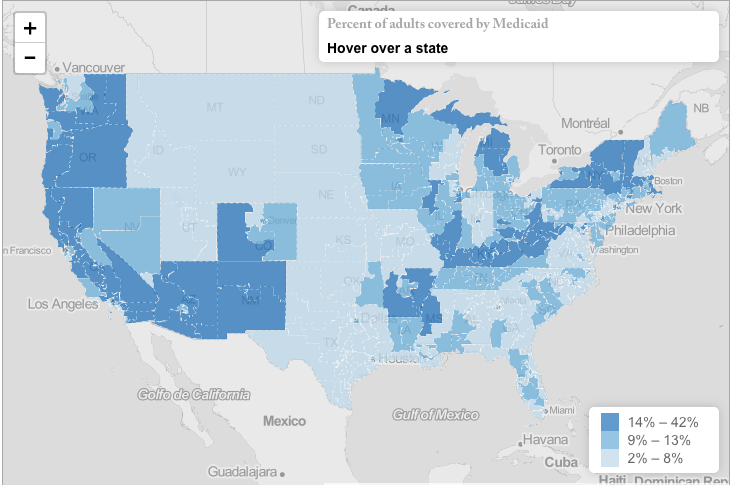Arizona
-
Melanie’s Story: A New Sense of Normal
Previously, Austin shared the story of bringing baby girl Melanie into her family’s life, and how TRICARE and Medicaid helped cover her child’s complex medical needs. Today, this amazing mom shares more about Melanie’s medical journey, and how, inspired by their youngest, this family became health care policy advocates. This blog was originally published by…
-
Melanie’s Story: Adopted by an Army Family Who Meets Her Complex Medical Needs
In honor of the “Month of the Military Child”, Speak Now for Kids published this story to help readers learn how military families like the Carriggs meet the health care needs of their children with complex medical conditions. This is the first blog post of a two part series by Austin Carrigg, the mother of three…
-
New GAO Report on Medicaid Waiver Evaluations Identifies Many Shortcomings
Earlier this week, the GAO released a new report that looks closely at Section 1115 Medicaid demonstration evaluations. The states examined are Arizona, Arkansas, California, Indiana, Kansas, Maryland, Massachusetts, and New York. The report was requested by Republican Members of Congress from the committees of jurisdiction. The report uncovered a number of problems including that…
-
States Work to Curb Drug Spending: Tight Budgets Lead to New Approaches to Managing Costs
Prescription drug spending in the United States continues to grow, totaling $477 billion in 2016. Spending by Medicaid, which is jointly funded by states and the federal government, surpassed $31 billion that year. These rising costs have strained state budgets, leading policymakers to look for strategies—within Medicaid and beyond—to better manage spending while ensuring a patient’s access to…
-
Tracking Medicaid Work Requirement Proposals
We here at Georgetown University CCF are closely tracking Medicaid Section 1115 demonstration waiver proposals as states attempt to create new barriers to coverage. There are many troubling proposals pending, but one of the most common is the imposition of a work or community service requirement as a condition of Medicaid coverage. As a reference,…
-
CHIP Funding Delays Risk Enrollment Freezes that would Reverse Success on Kid’s Health Coverage
Last week we released a new report on the consequences of delayed Congressional action on CHIP. Federal funding for CHIP expired 32 days ago, an unprecedented lapse in CHIP’s 20-year history. States are quickly running out of federal funding, with Arizona, Minnesota, and Oregon slated to exhaust federal funds before the end of December. If…
-
Why Projecting When States Will Run Out of CHIP Funds is a Moving Target
This week we released a new report on the consequences of delayed Congressional action on the Children’s Health Insurance Program (CHIP). Federal funding for CHIP expired 27 days ago, an unprecedented lapse in CHIP’s 20-year history. Some policymakers have reasoned that the situation is not urgent because all states have some unspent funds available from…
-
What Are the Consequences of Congressional Delay on CHIP?
Funding for the Children’s Health Insurance Program (CHIP) expired nearly a month ago and Congress still has not passed legislation to extend funding. Researchers at Georgetown University’s Center for Children and Families took a look at the consequences of the delay in CHIP funding. “This delay in funding CHIP is really unchartered territory and puts…
-
Nationwide Rate of Uninsured Children Reaches Historic Low
Nationwide 95.5 percent of children had health insurance in 2016, up from 95.2 percent the previous year—and up from 92.9 percent in 2013, the year before the ACA was fully implemented. While relatively few children rely on the ACA’s Marketplace for insurance, many gained coverage in Medicaid or CHIP when their parents signed up for…
-
Section 1115 Medicaid Waiver Comments
Georgetown University’s Center for Children and Families contributes an independent perspective to the public dialogue on the future of Medicaid through the lens of children and their families.
-
States Say They Will Run Out of CHIP Funds Faster than Projected; Will Congress Act in Time?
Ten states project they will run out of CHIP funds before the end of 2017 according to a new brief released by the Kaiser Family Foundation (KFF), based on responses from 42 states during the KFF’s annual Medicaid budget survey. The ten states are: Arizona, California, Connecticut, Hawaii, Idaho, Mississippi, Nevada, Oregon, Pennsylvania and Utah.…
-
State CHIP Snapshots
The Role of CHIP in Children’s Coverage In 2016 the children’s health insurance coverage rate in the United States dropped to just above 95 percent, an impressive achievement. Key to this success is the Children’s Health Insurance Program, which provides coverage to children who do not qualify for Medicaid but whose families cannot otherwise afford…
-
Arizona Children Most at Risk if Congress Fails to Renew CHIP
As the deadline to extend Children’s Health Insurance Program (CHIP) funding looms, states are in the difficult position of deciding what to do if new funds don’t materialize. As we’ve written before, Arizona is squarely in the crosshairs as the state whose children are most immediately at risk if CHIP funding is not renewed during…
-
Uninsured Rates for American Indian and Alaska Native Children are Coming Down But Are Still Too High: Medicaid Cuts Put These Kids at Risk
Continuing our deeper dive into recent coverage gains among at-risk populations thanks largely to Medicaid (like our recent report on Medicaid’s disproportionate role for small towns and rural areas), today we are releasing a new paper “Coverage Trends for American Indian and Alaska Native Children and Families.” The big takeaway: Uninsured rates for AI/AN children…
-
Coverage Trends for American Indian and Alaska Native Children and Families
Uninsured rates for children in American Indian and Alaska Native (AI/AN) families have dropped quickly in the past eight years, but they still remain high and will likely rise if substantial cuts are made to the Medicaid program, according to the report, Coverage Trends for American Indian and Alaska Native Children and Families. The report found: 54 percent of…
-
Top 10 Rural Counties With Largest Share of Kids and Adults Relying on Medicaid to Meet Health Needs
Using data from our Rural Health Policy Project, we just took a look at the counties across the country that have the highest percent of children and adults relying on Medicaid for their health care. As readers of SayAhhh! know, our study found that children living in small towns and rural areas are significantly more…
-
INTERACTIVE MAPS: Children Covered by Medicaid and CHIP by county, state or congressional district.
These maps show how many children are covered by Medicaid in each county and congressional district. Visit these links to view the maps, and to download handouts on your state’s coverage data: Percent of Children Covered by Medicaid/CHIP (congressional district) Percent of Children Covered by Medicaid/CHIP (county) Visit CCF’s State Resource Center for state-level data on health…
-
What Does House ACA Repeal Proposal Mean for Children and Families?
As the House of Representatives moves with rapid speed to pass legislation to repeal the Affordable Care Act, the public can finally get a glimpse of their plan – though the public still needs a lot more information about the proposal and the “intended” and “unintended” consequences it would have for children and families. The…
-
Arizona Medicaid Waiver Amendment Does Not Include Analysis of Impact on Budget and Individuals
Arizona will shortly be submitting an amendment to its existing Section 1115 waiver that includes some very major and unprecedented changes to its Medicaid expansion such as the imposition of a work requirement (which has to be verified on a monthly basis!), and a five-year life- time limit on Medicaid benefits. The state also seeks…
-
Arizona is Trying to Impose a Lifetime Cap on Medicaid Coverage
By Jesse Cross-Call, Center on Budget and Policy Priorities Arizona will soon send a proposal to the federal government to place a five-year lifetime limit on Medicaid coverage for adults under 65 who don’t have a disability. The government should reject the proposed time limit, which would lead to coverage losses and increase hardship among older, low-income…




















